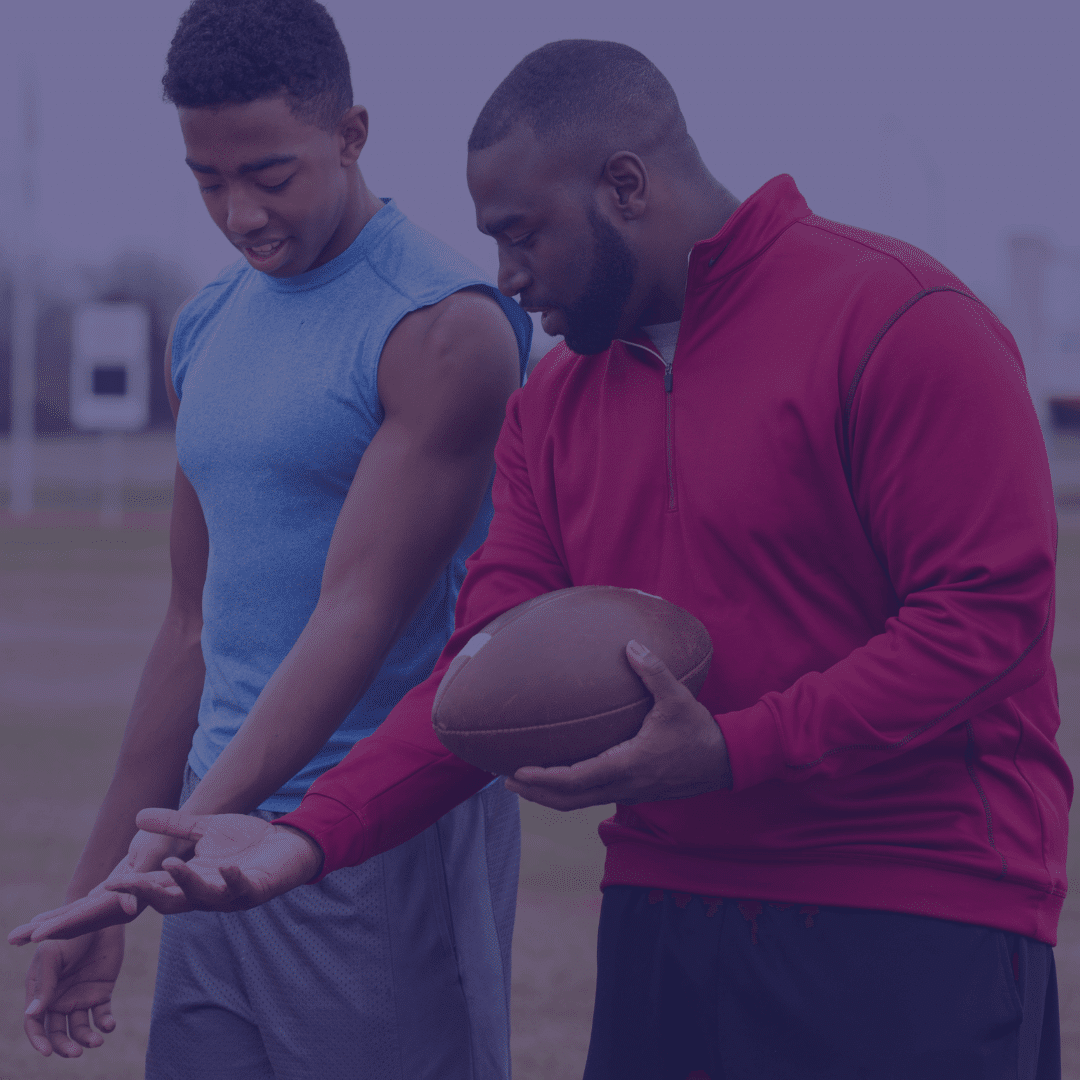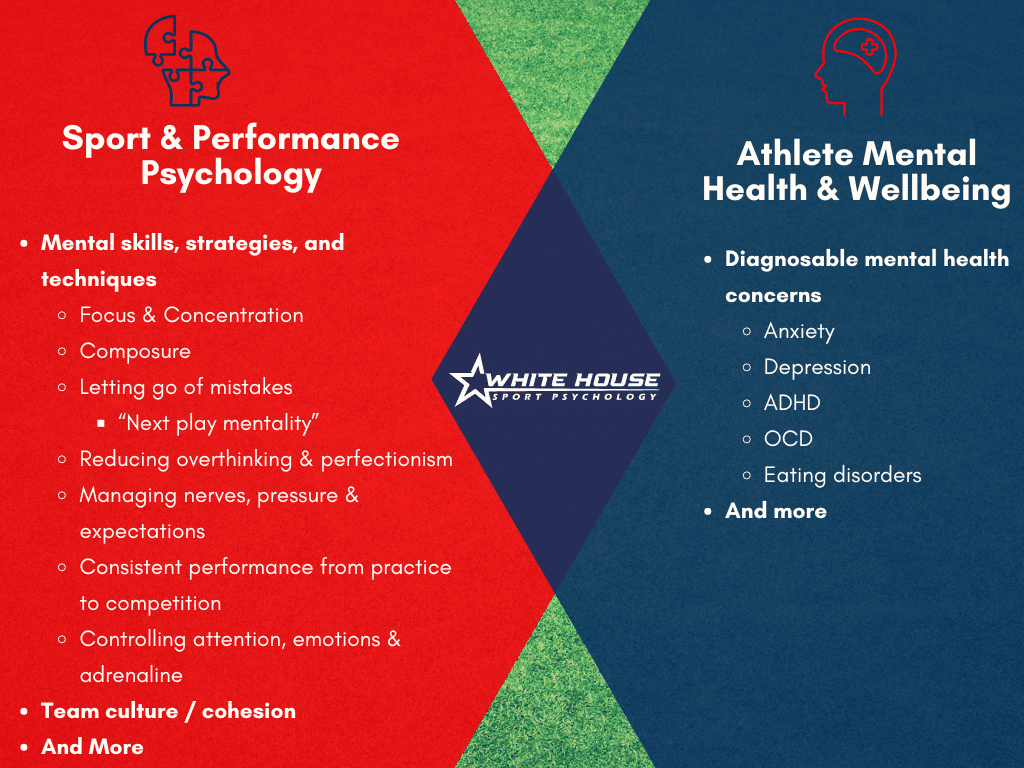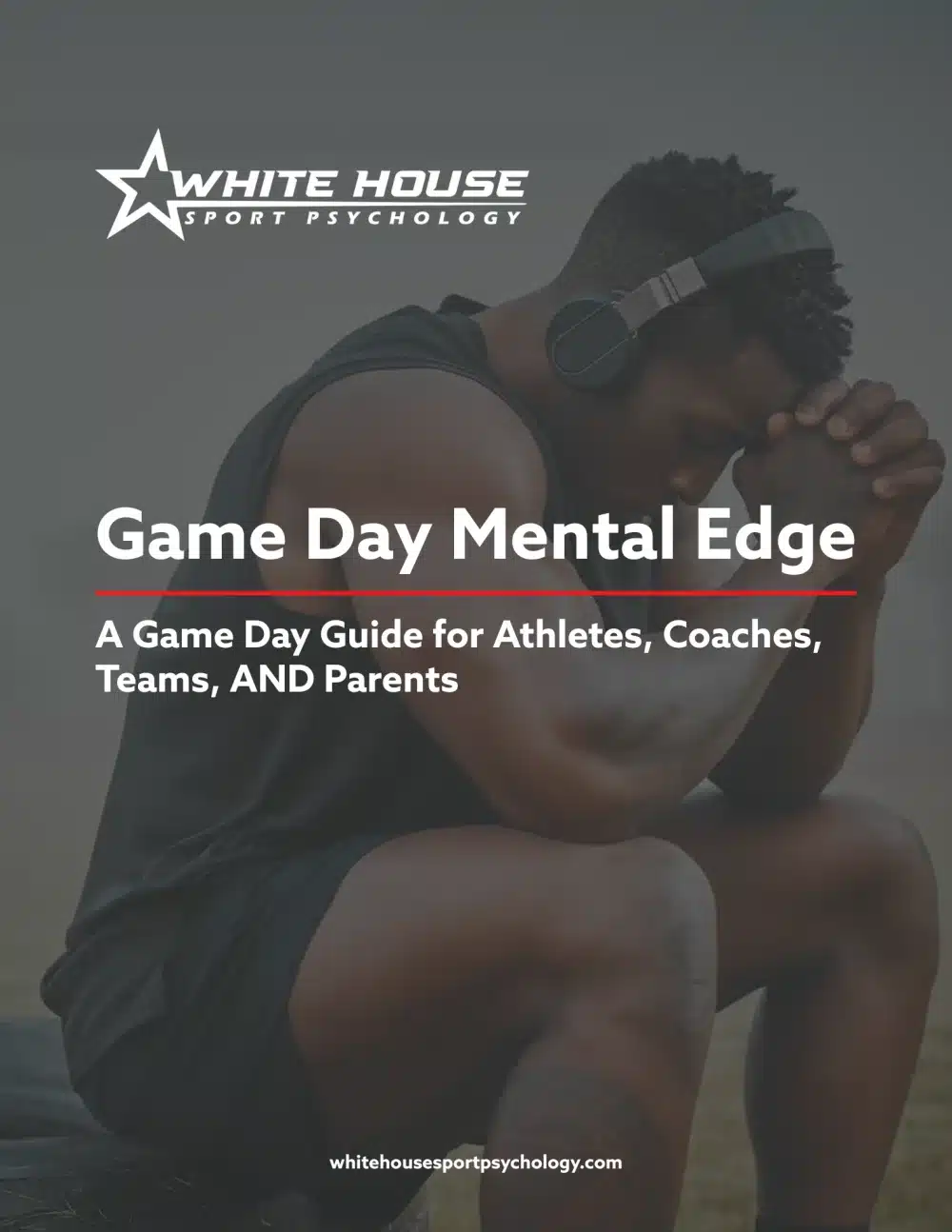In the most recent version of the NCAA mental health best practices, the core content has remained largely the same, but one crucial difference exists. Each NCAA member institution must demonstrate how they are fulfilling these practices by November 2025.
As a reminder, the NCAA mental health best practices are:
- Create healthy environments that support mental health and promote well-being
- Procedures for identification of student-athletes with mental health symptoms and disorders, including mental health screening tools
- Mental health action plans that outline referral pathways for student-athletes to qualified providers
- Licensure of providers who oversee and manage student-athlete mental health care
As athletic directors and other department staff work to establish these practices, they need to understand them and the variety of ways each can be accomplished and have a solid understanding of sport psychology as a discipline. Developing this understanding (and how it is different from traditional mental health) is a crucial first step in fostering the mental health, well-being, and performance of their student-athletes.
Understanding Sport & Performance Psychology
When discussing sport psychology, consider the two overlapping sections pictured below.In the red section, there are several items related to the mental side of sports. This is the part people talk about when they say things like, “Sports are 90% mental.” Each item is a mental process that affects our mindset and, ultimately, our performance. In short, they represent the more traditional aspects of sport psychology—aka the mental game.
In the blue section, we see several common mental health diagnoses. Athletes, like any other person, may face these challenges, and thus, they require meaningful attention as well.
We also need to recognize how these areas can overlap. Although each area is unique and distinguishable, they also influence each other. Athletes struggling with their mindset and not performing well in their sport may start to experience negative or critical thoughts about themselves.
Some may even develop symptoms of depression, anxiety, or other mental health diagnoses. Conversely, athletes facing mental health challenges may struggle to exhibit mental skills and mindsets critical to peak performance (e.g. grit, resilience).
In sum, this diagram shows how sport psychology consists of two different domains that overlap and influence each other.
Sport Psychology: More Than Just Mental Health Care
Returning to the NCAA mental health best practices, it’s important to remember that sport psychology encompasses more than traditional mental health care and is thus different in meaningful ways. These differences are critical to fulfilling the best practices individually and as a whole.
Creating Healthy Environments
Consider this: Athletes, coaches, and other staff members live and operate in a unique culture—an athletic culture. Elements of dedication, commitment, sacrifice, and discipline abound in athletic environments and are distinguishing features of athletic culture. Within athletics, expectations, norms, and standards don’t exist for more traditional students.
Thus, when addressing the mental health, well-being, and performance of student-athletes and striving to create a healthy environment, it is crucial for specific policies, procedures, and methods of application to align with the overarching culture of athletics. This requires awareness and consideration of many variables like:
- The method of delivery
- The timing and location of services
- Valuing the competitive nature of student-athletes
- Sensitivity and appreciation for the role sports have in an athlete’s life
- Understanding the stress, pressure, and expectations student-athletes face
- Appreciating the challenge of living as a publicly recognizable figure on campus
- Acknowledging the differences between a student-athlete and a traditional student
Beyond adapting the service to the culture, it creates an environment in which those adaptations are even possible. Environments where mental health and performance are treated as standard parts of health, well-being, and competitive success make it easy to adapt these services to the needs and desires of student-athletes.
One of the easiest ways to assess your athletic environment is to compare physical health, recovery, and training. Athletic trainers, strength & conditioning coaches, nutrition specialists, and others are consistently sought out to care for and enhance the physical health, well-being, and performance of the body.
Are athletes and coaches also seeking the support of licensed sport psychologists and certified mental performance consultants to enhance the mind’s health, well-being, and performance? The answer to this question can tell you a lot about the environment and culture within your athletic department.
Identifying Mental Health Symptoms
Another way to promote a healthy environment is to fulfill the NCAA’s next best practice—identifying student-athletes experiencing mental health symptoms or disorders via screening tools. Completing these screenings has dual benefits.
- Incorporating these screening processes conveys the importance of acknowledging and addressing mental health—thus promoting a healthy environment.
- These tools allow student-athletes to discuss concerns they may not share or discuss otherwise.
Such conversations, even brief conversations, create opportunities to mitigate minor stressors and problems. They also create opportunities to identify unrecognized mental health concerns or disorders, thus allowing for early intervention and support, which are often critical components of effective care.
Mental Health Emergency Action Plans and Referral Pathways
Similar to screening tools, every program should have a mental health emergency action plan and an outline of common referral pathways student-athletes can use to access qualified mental health providers.
It is common practice for athletic trainers to develop emergency action plans for emergencies involving physical health. More recently, emergency action plans that are specific to mental health have also emerged.
Some institutions have a general mental health emergency action plan as a blanket approach across campus. However, to appropriately address the context of athletics and the nuances of student-athlete life, a mental health emergency action plan that is specific to athletics is needed.
One significant distinction required within a mental health emergency action plan that is specific to athletics is how mental health emergencies will be managed when a student-athlete is traveling with their team to competitions off-campus and at other institutions.
Other more subtle distinctions include how to protect the privacy and confidentiality of student-athletes, who are often publicly recognizable figures on campus and in the community.
Beyond developing a mental health emergency action plan, clear pathways must be established for more traditional referrals and access to appropriate mental health care. Doing so facilitates quicker responses to mental health concerns and ensures athletes receive the care they need without delay.
Licensed Providers (With Specialized Education and Training)
Finally, it is critical to consider who is providing the sport psychology services, their level of training and expertise in sport, and who is overseeing the delivery of such services. First and foremost, a licensed clinician who not only understands general mental health but also possesses knowledge of sports and performance psychology ought to oversee the delivery of such services.
Once this initial position is established, it is critical to consider who directly provides the mental health and performance services. Data from college student-athletes tells us that they are less likely to use traditional mental health services (i.e. university counseling center) than the average student. However, when college student-athletes have access to a dedicated sport psychology resource they are three times as likely to use that resource.
Athletes prefer clinicians who understand the demands of sports. The following quote summarizes this principle very well:
“I’m not going to talk to a regular counselor who doesn’t know anything about sports. I need to talk to someone who can teach me how to stay focused and calm during tomorrow’s game.”
Yes, that perspective is pretty strong and direct, and at the same time, it is also very real. Such words and the emotion that filled his expression convey the need for professionals who can address the unique challenges faced by student-athletes—professionals trained above and beyond traditional mental health—aka, sport psychology professionals.
More Than Just a License
While having licensed professionals is part of the NCAA’s best practices, it’s essential to hire (or contract with) professionals who have specialized education and training in sport and performance psychology. Remember that athletes are three times more likely to use a dedicated sport psychology resource than a traditional counseling center.
Such data is driven by sport psychology professionals’ additional education and training. Although the NCAA’s guidelines are rather general, the nuances of mental health care for athletes require knowledge and expertise in this specialized field.
Not Just About Compliance: Caring & Support
Meeting NCAA mandates regarding mental health is not just about compliance; it’s about genuinely caring for and supporting student-athletes. By understanding these practices and exploring various implementation methods, coaches and athletic directors can strengthen their programs, promote greater success, and build appeal for recruits and future student-athletes.
Here at White House Sport Psychology we want to serve as a meaningful resource for your athletic department. Whether we do that by directly supporting student-athletes, providing consultation to coaches and administration, or simply providing insightful content, we want you to know that we are a trusted resource here to help you and the athletes representing your institution.
Naturally, such trust is predicated on building a meaningful professional relationship. Learn more about White House Sport Psychology or schedule a free consultation to discuss how our sport and performance psychology experts can support your school’s mental health initiatives.


